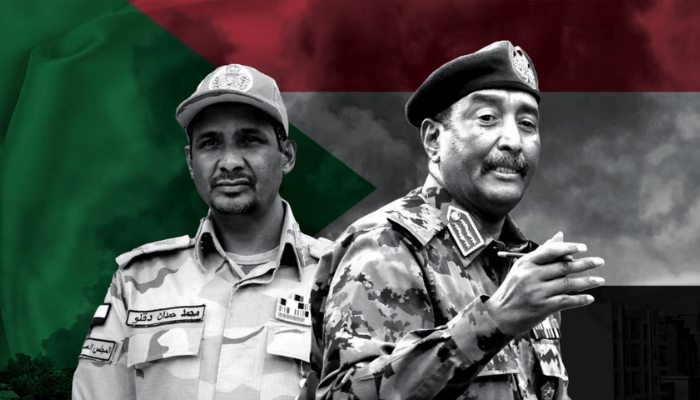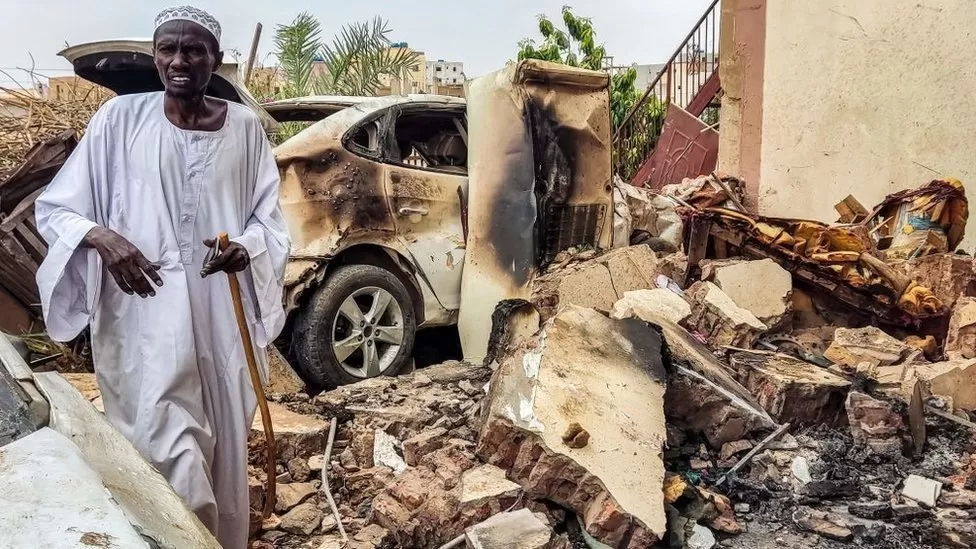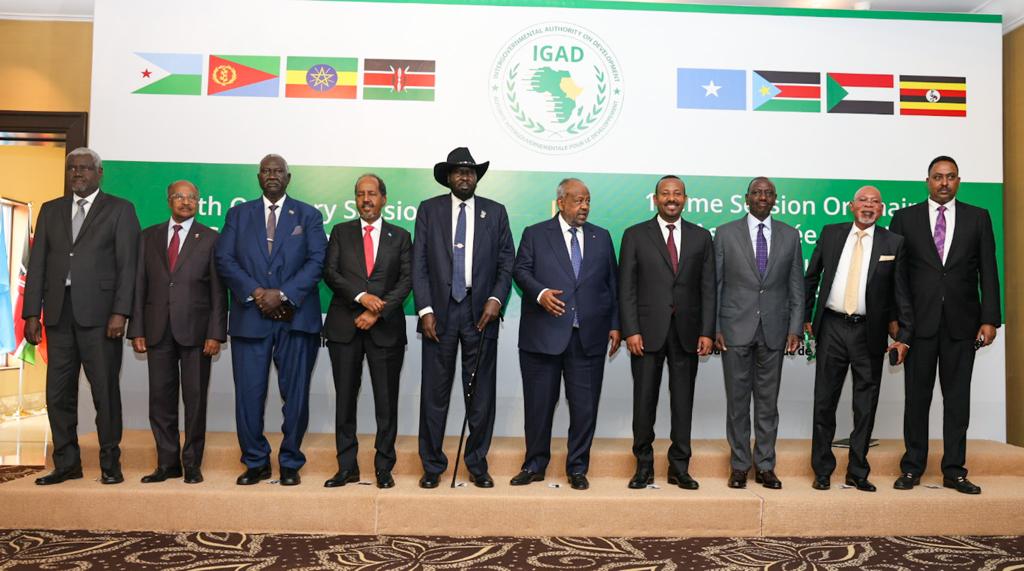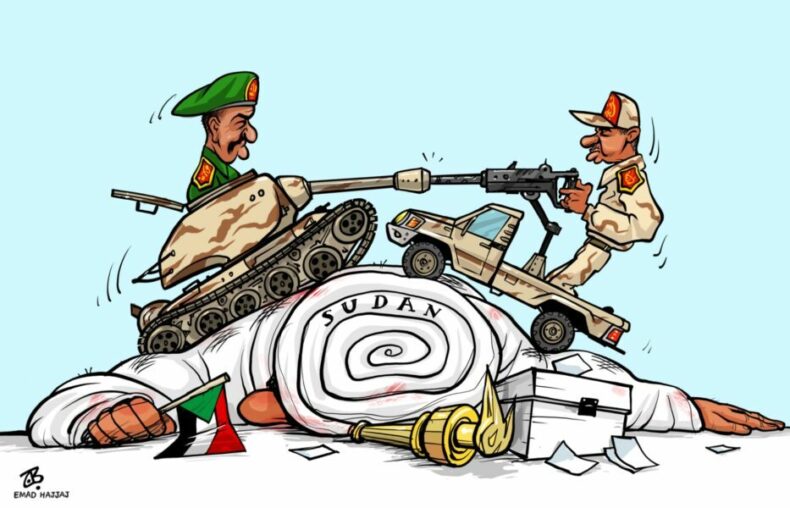Four East African nations, led by Kenya, are urging the deployment of a regional force to protect civilians and make sure that humanitarian relief reaches the millions of people stuck in the conflict zone as a strong indication of their commitment to putting an end to the intensifying crisis in Sudan.

The warring factions, however, have shown no interest in anything other than a military triumph since the battle started in mid-April, so winning their support will be difficult.
To discuss methods to put an end to the war between the Sudanese army and the paramilitary Rapid Support Forces (RSF), Egypt is holding a conference with Sudan’s neighbours. Most of eastern and central Sudan is under the hands of the military, which is led by Gen. Abdel Fattah al-Burhan, and is trying to hang onto its bases in Khartoum, the country’s capital.
In Khartoum, where its fighters have been accused of murder, rape, occupying and pillaging hospitals, the opposition RSF, led by Gen Mohamed Hamdan Dagolo, a.k.a. “Hemedti,” has made gains.
In the capital, the military mercilessly bombs RSF positions, allegedly killing a large number of civilians.
In Darfur, Sudan’s western area, horrible bloodshed is raging beyond the media horizon.
Most of the area has been taken over by the RSF. RSF fighters have expelled tens of thousands of Masalit from their traditional homestead in western Darfur together with their ally Arab militia.

The Sultan, the group’s traditional leader, had his palace set on fire. Men wearing RSF uniforms kidnapped and executed the governor, Khamis Abubakar when he referred to it as “genocide.”
Over 160,000 Masalit refugees crossed into Chad from the other side of the border. Along with encircling the two largest cities in the area, al-Fashir and Nyala, the RSF also pillaged Zalingei, which is where the Fur community calls home.
Many Darfuris worry that this is the climax of a long-term strategy to turn the ethnically diverse region into an Arab-ruled territory.
The safety of civilians is a pressing requirement in western Darfur. Ironically, this was precisely the mandate of the UN-AU Mission in Darfur. However, it was withdrawn two years ago in a move that now appears to have been extremely foolish.
El-Obeid, the state capital of North Kordofan, is also under siege by RSF forces. Only small areas west of the Nile River will have a military presence if they manage to take it.
The Sudan People’s Liberation Movement-North, which has been waging its insurgency in South Kordofan for the past 12 years, has pushed into the state capital Kadugli since the military is overextended battling the RSF.
There is an abrupt rush of diplomatic action. However, there is no consensus over who should take the lead. The US and Saudi Arabia have been holding ceasefire negotiations in the Saudi city of Jeddah since the second week of the fighting.
But there has been little slowing in the rate of bloodshed despite promises for a halt in hostilities, most recently during the Eid al-Adha holiday.
What is IGAD? How will it help end the War?
In the upcoming days, the US and Saudi Arabia claim they will put out a new plan. They have also made attempts to enlist the United Arab Emirates (UAE), which is noteworthy because the UAE is often regarded as the RSF’s principal supporter and, according to some accounts, still provides them with weapons. UAE officials have not responded to the reports.

East African leaders started their initiative under the aegis of the regional organization ‘Igad’ less than a month ago after becoming dissatisfied with the African Union’s (AU) lack of enthusiasm in handling the problem.
To reestablish Sudan’s democratic transition, a group of leaders from Kenya, Ethiopia, South Sudan, and Djibouti was chosen to seek a ceasefire, humanitarian access, and political engagement.
This group of officials, who met on Monday in Addis Abeba, the capital of Ethiopia, started the process of putting together a regional intervention force.
Their second strategy involves collaborating with the US and Saudi Arabia to arrange a face-to-face meeting between Burhan and Hemedti, the opposing generals, to establish a truce.
An “inclusive political process” is track three, and it will begin in August. To ensure that Sudan returns to the democratic path, it is necessary to gather civilian representatives and provide them with sufficient political support so that they have genuine bargaining power.
The group’s leader, Kenyan President William Ruto, has been outspoken, calling the conflict “senseless,” denouncing both sides for using force “to destroy the country and kill civilians,” and cautioning that there are “already signs of genocide” in Darfur.
The plan was rejected by Gen. Burhan, who asserted that Mr Ruto is biased in favour of the RSF. He also charges some of the civilian party officials with supporting Gen Hemedti; they respond that Gen Burhan has organized Islamist groups to support him. He agreed to come to the meeting on Monday but changed his mind. There was an RSF representative present.
Where are the UN and the European Union in the time of Crisis?
The US initially chose to stick with the AU rather than show support for Mr. Ruto’s idea. However, it has now decided to participate in the highest-level African intervention to date.
South Sudan is already unstable due to the turmoil in Sudan. Gen Hemedti ordered that South Sudan stop making payments to the Sudanese government, namely Gen Burhan, for the use of the oil pipeline to Port Sudan, the only export route for that nation’s primary source of income. On the demand, South Sudan has not yet responded.
The United Nations is no longer relevant. Volker Perthes was picked as its special representative for Sudan rather than someone with experience mediating a bloody conflict because of his technical expertise in assisting institution-building during the now-abandoned transition to democracy.
Gen. Burhan has also proclaimed him to be persona non grata. The majority of Sudanese are appalled by the UN’s shortcomings in Sudan and do not want it to spearhead diplomatic efforts.
Sudanese are similarly concerned that because of the European Union’s fixation on migration, they will deal with any politician who pledges to stop the huge exodus.
The EU contests the Sudanese accusation that it supported the RSF in the past as part of a strategy to control the nation’s boundaries.
Sudan’s peace is facing a formidable assault. The plan put forth by African leaders is the most audacious and comprehensive to date, but there are still numerous obstacles in the way of peace, not the least of which is the unwillingness of the warring parties to acknowledge the impossibility of resolving the conflict militarily.













